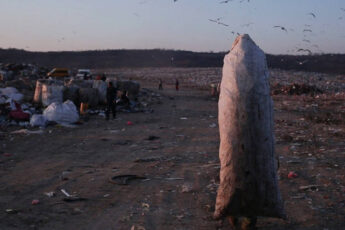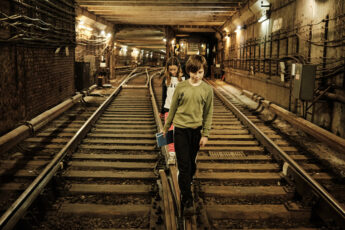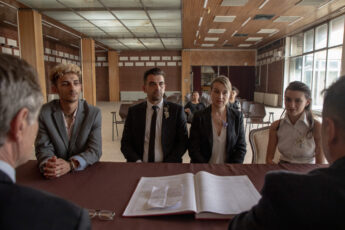“Find Your Own Noise.”
Klaudiusz Chrostowski’s Ultima Thule (2024)
Vol. 140 (December 2023) by Jack Page
Ultima Thule chronicles a tragic chapter in the life of Bartek (Jakub Gierszal), a young man who has fled his native land of Poland to disappear in the remote Scottish islands of Shetland. As the mystery of why he had to leave his family and girlfriend unannounced unfolds, Bartek befriends local farmer Magnus (Arthur Henri). While their bond deepens, Bartek soon realizes that the very life he sought to leave behind is catching up with him. Even on the farm settled at the end of the world, the past still finds Bartek and he is forced to re-evaluate his recent traumatic experience before he can move on with his life.
Through brief phone calls, the broken pieces of Bartek’s home life are revealed. Wracked with guilt, he confesses to his girlfriend Weronika (Weronika Humaj) that he feels responsible for this father’s death, questioning if he might still have been alive today had he not declined his calls. Bartek’s relationship with his brother Szymek is even more tumultuous, as they argue about who is left to look after their mother. In a desperate refusal to accept the reality of his father’s passing, Bartek continues to ignore his problems by focusing solely on the manual labor jobs he is given on the farm. It is not until he sparks a therapeutic kinship with Magnus that he begins to externalize his feelings and learns to confront the pain head on.
Magnus’ character balances a fine line between friend and father figure for Bartek. He sympathizes with the boy’s situation and allows him to stay at the farmhouse for free, as long as he helps with the maintenance of the farmland. One poignant sequence in particular sees Magnus instructing Bartek on how to herd the sheep, encouraging him to “find your own noise” when guiding the animals back into their pen. More importantly, it is Magnus’ advice that acts as a wake-up call that triggers Bartek’s realization and acceptance of his father’s death. By coming to Scotland, Bartek thought he was living out his father’s dream of sailing to Shetland, when in fact he was merely delaying the grief he had been avoiding thus far. In these rare heart-to-heart moments between the two (digging the peat bank or ruminating by lamp light together), the dialog is stripped back to its colloquial core and delivered expertly with a threadbare sincerity by the actors. Magnus warns Bartek: “don’t ever let the rest of the world disappear because then you’ve lost yourself”. Given the subtext, it’s as if he is saying that simply running away from our problems doesn’t help us to forget that they still exist and the bravest of us turn inwards and face the truth. Delaying the confrontation of Bartek’s psychological trauma will only make it harder to negotiate his emotional response to his father’s death later on in life. We risk more in trying to forget the past than we do in confronting it, no matter how painful it may seem. Magnus summarizes it so succinctly: “the longer you stay here, the bigger the island becomes and the harder it is to leave”. These lines of dialog are just a few examples of the emotively charged language used in the film, which manifests itself in the smallest, most simple words.
Whether it’s the sound of the howling wind that constantly rattles the windowpanes of the farmhouse or the long shots of the billowing mist that rolls down the grassy hills, the sublime landscape of the Scottish countryside is always on display. Despite its natural beauty, I believe it is used beyond its aesthetic allure in Ultima Thule. The weather changes throughout the film, from beams of sunlight cutting through low clouds, to the thick fog that hangs like a ghostly layer over the cold, muddy ground. In this sense, the weather is representative of Bartek’s psychological turmoil as he battles an emotional storm within himself. Just like the unpredictable forecast, the protagonist too cannot make up their mind. At Bartek’s lowest moments, the external surroundings seem to mimic his mood, turning grayer as the mist, fog, and cloud suffocate the landscape and quite literally limit the viewer’s visibility. In this sense, both Bartek and the spectator cannot see what lies ahead, sharing the rising feeling of doubt and the depression of the enveloping darkness.
Nature is not just a force to be reckoned with in Ultima Thule, but it also has healing qualities. Bartek’s work on the farm does give him a momentary respite from his troubles, but it is a lamb nicknamed Cupcake that he adopts as a pet which reignites his otherwise absent sense of accountability. When he discovers the lifeless body of the animal in a nearby cavern towards the end of the film, Bartek begins to seriously question his decision to leave home unannounced and proceeds to call his mother to apologize for his recent actions. In the last shot of the film, Bartek is lying on his couch, physically and emotionally exhausted, and the tip-tap of Cupcake’s hooves can be heard before it enters the living room, completely unharmed. One positive interpretation could be that the uplifting return of the creature foreshadows Bartek’s own journey to go back home. Since he has been forgiven by his mother and his girlfriend has a deeper understanding of his pain, there is nothing left in Poland for him to run away from.




Leave a Comment